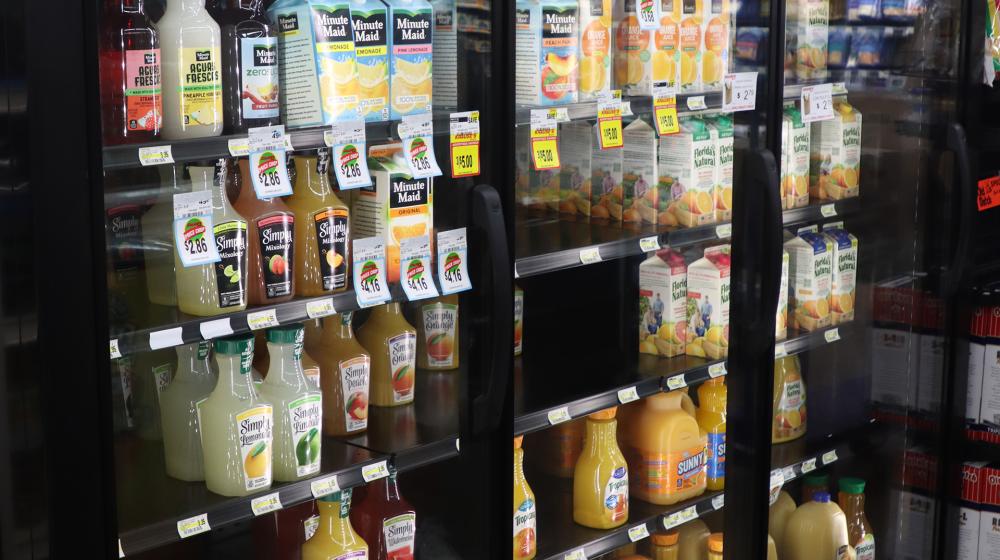
Four short miles north of Lake Sakakawea and just along the highway as you enter Garrison, ND, (population: 1,467), sits a non-descript, beige warehouse. As the saying goes, if you blink too long, you might miss it. From the outside, Krause’s SuperValu might look like any other small-town grocery store, many of which have endured significant challenges and, too many, closed their doors in recent years in North Dakota. But walking up and down the well-stocked aisles and through the brightly colored produce and fresh meats selections at Krause’s leaves a lasting impression on lake visitors in the same way it provides daily impacts for the locals who rely on Krause’s doors staying open.
While trying to remain viable as a business in a rural community is nothing new, countless small towns in North Dakota have experienced firsthand the tremendous loss and ripple effects that come when a local grocer closes its doors. With a limited customer base, long transportation routes for suppliers, and increased food, energy, and workforce costs, the challenges to make even a minimal profit keep piling up.
As several organizations, entities, and leaders have stepped up to help address some of the challenges being faced by our state’s rural grocery stores, USDA Rural Development has been a partner by helping Krause’s and others like it access critical funding through the Rural Energy for America Program (or REAP), a federal program that increased its grant assistance with the passage of the Inflation Reduction Act.
“Utilities are a major part of the expense factor, so anything you can do to save energy is beneficial,” said Dalles Krause, owner, Krause’s SuperValu. “When everything is running, it draws a lot of power. There are factors like how many times a customer opens the door that have an effect on utilities. It makes it hard to make money in the grocery store.”
With monthly and sometimes weekly utility bills in the thousands of dollars, investing in energy-efficiency efforts amounts to almost immediate savings for their business. REAP provides grant funds to rural businesses to make energy-efficiency improvements more achievable and affordable. Krause applied for and was awarded a REAP grant to support some of the costs to upgrade the Garrison store’s refrigeration and to install a more efficient HVAC system.
Much like Krause, Donna Marthe, owner of Harvey Warehouse Grocery, located 90 miles east of Garrison in Harvey, ND (population: 1,621), applied for and was awarded a REAP grant. The multi-generation, family-owned store, whose space was built in 1982 and was once a bowling alley, has been a long-time staple for the small community.
“We are a grocer’s family,” said Marthe, as she stocked shelves and priced items. “I had a brother at our Underwood store and another brother at our store in Lisbon. My dad had this building first and I bought it from him in the mid 90’s.”
With the passing of time comes major technology changes and the need for costly equipment, repairs, and upgrades. Marthe secured REAP funding from USDA Rural Development to offset 25% of the significant investment she knew needed to be made to continue offering the quality and variety her community deserves.
“We had replaced some coolers maybe 20 years ago,” said Marthe. “We wanted to have the ability to know how old everything was going to be, so we decided to do the whole thing. We were able to replace our coolers and compressors. The new coolers even have sensors that are linked to a phone that we can monitor. We saw the savings right away, even with the installation being in two parts.”
With similar stories at NDGS Inc. in Watford City, ND, awarded in 2023, and one soon-to-be told by USDA Rural Development’s most recently announced recipient to Bronson’s SuperValu in Beulah, ND, the local impacts being felt by the Rural Energy for America Program are helping make good on the USDA Rural Development mission to improve the economy and quality of life in rural communities.
As was evident in both Garrison and Harvey, local grocery stores in rural communities are so much more than just business. They are great employers and supporters of their local economies and provide essential services to the friends and neighbors they serve. Bucking the recent trends of grocery store closures in rural North Dakota takes hard work, dedication, and investment. In Garrison, there’s one thing Krause isn’t worried about, and that’s the support the store gets from the local community.
“There is no town more loyal than Garrison,” said Krause. “Garrison’s motto is ‘Check Garrison first,’ and it’s very true. We are a family here.”

